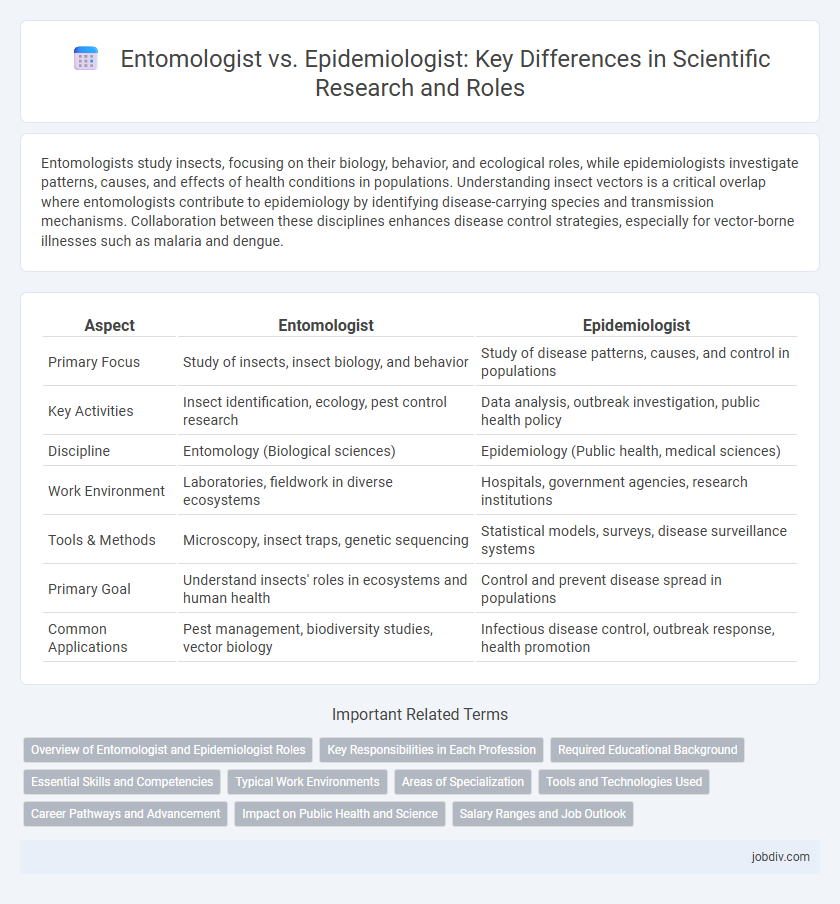Entomologists study insects, focusing on their biology, behavior, and ecological roles, while epidemiologists investigate patterns, causes, and effects of health conditions in populations. Understanding insect vectors is a critical overlap where entomologists contribute to epidemiology by identifying disease-carrying species and transmission mechanisms. Collaboration between these disciplines enhances disease control strategies, especially for vector-borne illnesses such as malaria and dengue.
Table of Comparison
| Aspect | Entomologist | Epidemiologist |
|---|---|---|
| Primary Focus | Study of insects, insect biology, and behavior | Study of disease patterns, causes, and control in populations |
| Key Activities | Insect identification, ecology, pest control research | Data analysis, outbreak investigation, public health policy |
| Discipline | Entomology (Biological sciences) | Epidemiology (Public health, medical sciences) |
| Work Environment | Laboratories, fieldwork in diverse ecosystems | Hospitals, government agencies, research institutions |
| Tools & Methods | Microscopy, insect traps, genetic sequencing | Statistical models, surveys, disease surveillance systems |
| Primary Goal | Understand insects' roles in ecosystems and human health | Control and prevent disease spread in populations |
| Common Applications | Pest management, biodiversity studies, vector biology | Infectious disease control, outbreak response, health promotion |
Overview of Entomologist and Epidemiologist Roles
Entomologists specialize in studying insects, examining their behavior, physiology, and impact on ecosystems, agriculture, and human health. Epidemiologists analyze patterns, causes, and effects of diseases in populations, utilizing data to control and prevent outbreaks. Both roles contribute to public health but differ in focus: entomologists often research insect vectors, while epidemiologists concentrate on disease transmission and prevention strategies.
Key Responsibilities in Each Profession
Entomologists primarily study insect biology, behavior, and ecology to understand pest control, pollination, and disease vectors. Epidemiologists analyze patterns, causes, and effects of health and disease conditions in populations, focusing on outbreak investigation, data collection, and public health interventions. Both professions contribute to disease prevention, with entomologists targeting vector control and epidemiologists addressing disease transmission and population health trends.
Required Educational Background
Entomologists typically require a bachelor's degree in entomology, biology, or a related field, with advanced research roles often demanding a master's or PhD specializing in insect science. Epidemiologists need at least a master's degree in public health (MPH) or epidemiology, with many pursuing doctoral degrees to engage in extensive research and policy development. Both fields emphasize strong foundations in biology and statistics, but epidemiologists also require expertise in disease surveillance and public health methodologies.
Essential Skills and Competencies
Entomologists require expertise in insect biology, taxonomy, and ecological research methods to study insect behavior and their impact on ecosystems effectively. Epidemiologists must possess strong analytical skills, proficiency in statistical software, and a deep understanding of disease transmission and public health principles to track and control outbreaks. Both professionals benefit from critical thinking, data interpretation, and interdisciplinary collaboration to address health-related challenges.
Typical Work Environments
Entomologists typically work in research laboratories, universities, agricultural fields, and natural habitats studying insect behavior, ecology, and physiology. Epidemiologists are often found in public health departments, hospitals, research institutions, and government agencies focusing on disease outbreak investigations and health trend analysis. Both professions may collaborate in field studies where vector-borne diseases are a concern, blending entomological expertise with epidemiological data collection.
Areas of Specialization
Entomologists specialize in the study of insects, their behavior, ecology, genetics, and roles in ecosystems, including their impact on agriculture and biodiversity. Epidemiologists focus on the patterns, causes, and effects of health and disease conditions in populations, utilizing statistical analysis and field investigations to identify disease outbreaks and inform public health strategies. Both professions contribute to public health, with entomologists often concentrating on vector-borne diseases and epidemiologists addressing broader disease surveillance and prevention.
Tools and Technologies Used
Entomologists utilize specialized tools such as insect nets, microscopes, pheromone traps, and genetic sequencing technologies to study insect behavior, physiology, and taxonomy. Epidemiologists rely on data analytics software, geographic information systems (GIS), statistical modeling, and laboratory diagnostics to track disease patterns, identify outbreaks, and analyze public health data. Both professions employ molecular biology techniques and remote sensing technologies to enhance understanding of vector-borne diseases and their environmental impacts.
Career Pathways and Advancement
Entomologists typically pursue careers in research, agriculture, or public health, specializing in insect biology and its applications, with advancement opportunities in academia, governmental agencies, and private sector pest management. Epidemiologists focus on the study of disease patterns, causes, and control in populations, often working in healthcare institutions, public health departments, and research organizations, progressing to senior analysis, policy development, or leadership roles. Both careers require advanced degrees and specialized training, with growth potential influenced by expertise, publication record, and contribution to public health initiatives or scientific advancements.
Impact on Public Health and Science
Entomologists play a crucial role in public health by studying insect vectors that transmit diseases, enabling the development of targeted pest control strategies to reduce outbreaks. Epidemiologists analyze patterns, causes, and effects of diseases in populations, providing essential data to inform public health policies and intervention programs. Collaboration between entomologists and epidemiologists enhances understanding of disease transmission dynamics, thereby improving prevention and control measures for vector-borne diseases.
Salary Ranges and Job Outlook
Entomologists typically earn annual salaries ranging from $50,000 to $90,000, reflecting positions in research, agriculture, and environmental biology. Epidemiologists have a broader salary range, often between $60,000 and $100,000, influenced by roles in public health, government agencies, and healthcare organizations. Job outlook for epidemiologists is projected to grow by 13% through 2031 due to increasing demand for disease control, while entomologist employment is expected to grow more slowly at about 5%, driven by needs in pest management and ecological research.
Entomologist vs Epidemiologist Infographic

 jobdiv.com
jobdiv.com